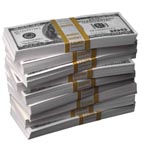Quail, lamb, Vermont brie for G20 maiden summit
 Washington - Before getting down to serious business at the G20 summit in Washington, leaders of the world's 20 leading economies were celebrating Friday evening with a gourmet meal at the White House.
Washington - Before getting down to serious business at the G20 summit in Washington, leaders of the world's 20 leading economies were celebrating Friday evening with a gourmet meal at the White House.
There's a financial emergency knocking at their doors and their national stock markets have shed more than one-third in value over the past tumultous year. But the G20 leaders are also marking a historic occasion: It's the first time ever that they've come together at the summit level, however hastily organized it was.
And what better way to build strength for the formal summit on Saturday than a meal of fruitwood-smoked quail with quince gastrique, followed by thyme-roasted rack of lamb and eggplant fondue?
According to an e-mail from First Lady Laura Bush's office, the banquet will end with pear torte and huckleberry sauce - and, in a concession to Euro-American cuisine, baked Vermont brie with walnut crostini.
With such good food, it's hard to imagine harsh words at the table. Then too, the seating order will make sure that harmony prevails.
Russia's new President Dmitry Medvedev, in the US for the first time as leader, will rub elbows with Argentine President Cristina Fernandez de Kirchner and Holland's Prime Minister Jan Peter Balkenende - and out of shouting distance from US President George W Bush, according to officials familiar with the seating order.
Bush is sitting between Chinese President Hu Jintao and Brazilian President Luiz Inacio Lula da Silva, the president of the G20 - a symbolic recognition of their growing say on international matters as leaders of rapidly growing economies.
Two seats away from Bush at the oval table in the state dining room is French President Nicolas Sarkozy, the current leader of the European Union who pushed Bush to arrange the summit and even suggested it should be held in New York to recognize the US role in creating the crisis.
Outside the White House, a coalition of groups protesting against the summit organised a "People's Banquet" with a modest menu of free food that included beans and rice, cookies, sandwiches and bottled water.
"We're offering free food in the spirit of inclusiveness - while world leaders are wining and dining inside the White House," said Lacy MacAuley of Global Justice Action, a Washington DC group and one of the organizer's of the banquet.
"We're demanding that the G20 put people's needs above profit and that the global economy be re-structured to accomplish the basic needs of people," she told Deutsche Presse-Agentur dpa.
Liz Hourican of Code Pink for Peace said that while Bush planned to feast with world leaders, "nobody wants to talk to him. He's not relevant anymore."
The G20 was founded in 1999 as an amalgam of industrialized and emerging countries that were worried about the international implications of the financial crises of the 1990s, in South Asia and Mexico.
Officially, it operates at the lower level of finance ministers and central bank governors of 19 member countries: Argentina, Australia, Brazil, Canada, China, France, Germany, India, Indonesia, Italy, Japan, Mexico, Russia, Saudi Arabia, South Africa, South Korea, Turkey, Britain and the US. The European Union represents the 20th country.
In the meantime, however, ever-more-muscular Brazil, Russia, India and China have formed their own group, called BRIC, to lobby for more weight in international organizations and trade talks.
As Wall Street started melting down in September, much of the rest of the world stood at arm's length, insisting it was a US problem that would not affect them.
But in the end, the global economy felt the pain from the excessive risks taken by US financial institutions. As the crisis drained the world's credit lines and wiped out tens of billions of dollars in stock market wealth, the US recognized the need to include not only the G7 group of industrialized countries but also emerging economies.
Much of the world's growth has been happening outside the stagnating G7, as former World Bank president James Wolfensohn pointed out Friday in the Washington Post.
Between 1965 and 2002, the G7 accounted for 65 per cent of global output, Wolfensohn noted. In recent years, that figure has dropped to 52 per cent and is likely to drop to 25 per cent by 2050. (dpa)